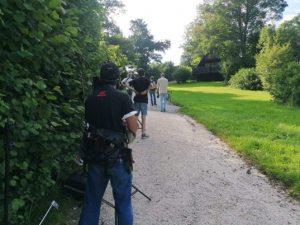by Jonny Roberts
This essay, if that is what it can be called, attempts to be a series of reflections upon the relationship between collaborative online script writing, and the act of teaching groups of students to become experimentally collaborative in a virtual environment.
A string of twinkling lights desperately grip the branch of a tree, as the weather punishes them for attempting to continue illuminating the afternoon darkness of this late January day. The dying light switches my focus from the outside world, to a hastily assembled desk and the laptop that illuminates my surroundings, as I begin to see my reflection in the window. Wednesday afternoons in the middle of winter are always quite odd. A mixture of dark afternoons and mid-week blues often leads to students drifting into a combination of de-motivation, distraction and avoidance. This year, to make matters worse, we are locked down. Communicating only through an outdated laptop monitor and headphones.
For many years I have utilised video calls for co-writing scripts, editing films, and experimented with the presentation of live performance at international art fairs and exhibitions. Nothing unusual, or technically outstanding with any of these experiments, but that doesn’t really matter.
Ten minutes before the session, and I’m prepared, ready to go. It is almost time to continue the discussion about how a time of irreverence during the 20th Century affects the way we create work today. The absurdity of discussing such topics in a formal academic context during a non-pandemic year is never lost. In light of our current situation the absurdity heightens, and as I glance again at the facing window, I realise the futility of this action.
Remembering that I forgot to collect my coffee, I quickly head to the kitchen, passing my son’s room, where he is attending his course without headphones. I hear a voice, but not the words spoken by his lecturer, and returning to my own screen consider the experience of the students about to enter the virtual studio. The way in which we were thrown into this situation where the offering of stilted information became the norm, at the expense of a wonderfully banal conversation.
As the attendees arrive, a wall of muted videos bearing the initials of each participant, all greeted with the usual civilities of an online session. A question pops into my mind, and before I have time to answer I hear myself ask the assembled group… is anybody else bored? Following the wave of agreement, and a collective sense of relief, the remainder of the afternoon was spent chatting, joking and experimenting with the functions within the call. One student found that they can change their video feed to a moving avatar, one found that they had the ability to mute my microphone due to a glitch in the software, another that they could join the call an infinite number of times, causing multiple versions of themselves to echo through the conversation. Over time more of the blank initials became faces. I put my notes to one side, and observed the interactions, listening to the conversations, watching as the group collaborations escalated into the absurd.
It is nearly midnight, and I’m in another writing session with my co-writer who lives in Germany. We are in the middle of a short script to be filmed over the next few months. As often happens, silence takes over as we both, deep in thought, rummage around the internet for images that would best communicate the nature of the main character, and feel for the location. Sometimes nothing happens, sometimes we become distracted by anecdotes about people we have met, general nonsense, or begin to experiment with the technology.
My mind wanders, as I begin to recognise the pattern of working online. Talking, experimenting, collaborative research, and probably most important of all… silence. It is through this silence that ideas flow, reflection takes place, and, as with meeting away from the virtual work, confidence in each other's space develops.
The film? One of several that grow within the extensive online catalogue of shared documents. This one, another comedy to be filmed in German, follows the story of a competitive village attempting to win a prize for being the most inclusive village in Germany.

Socially distanced filming in Germany
I’ve written collaboratively online for so long that my family ignores my laughter, unusually louder than necessary due to my headphones. Long before the current pandemic caused so many to leave the real world. It is perhaps due to this that I have enjoyed the process of watching the experiments of the participants within the group calls; as new collaborations emerge, demonstrating the individual strengths of each person. So often I have heard other lecturers complain about working online, or attended those awkward meetings where the uptight senior member of staff panics as they slowly lose control of a situation, either through the one member of staff who forgets to mute their mic as they discuss the details of their day, or that one essential diagnostic graph within a document that they can’t share. I find this the most entertaining part of the online working day.
An extended element that I have found in all of these situations, is that working online can be fun. In some ways it can be easier than working in the physical world. New ways of working can be developed, mistakes are inevitable, but the outcomes are usually absurdly entertaining, and closer to the irreverent artistic movements from the 20th Century than a stuffily rehearsed academic speech about the subject.
Can you see the presentation on your screens? Are you all still there? I forgot to mention, I cannot speak a word of German.
About the Author
Jonny Roberts is an artist, performer, writer and senior lecturer in Fine Art. His work has featured on BBC3 and art festivals around the world.